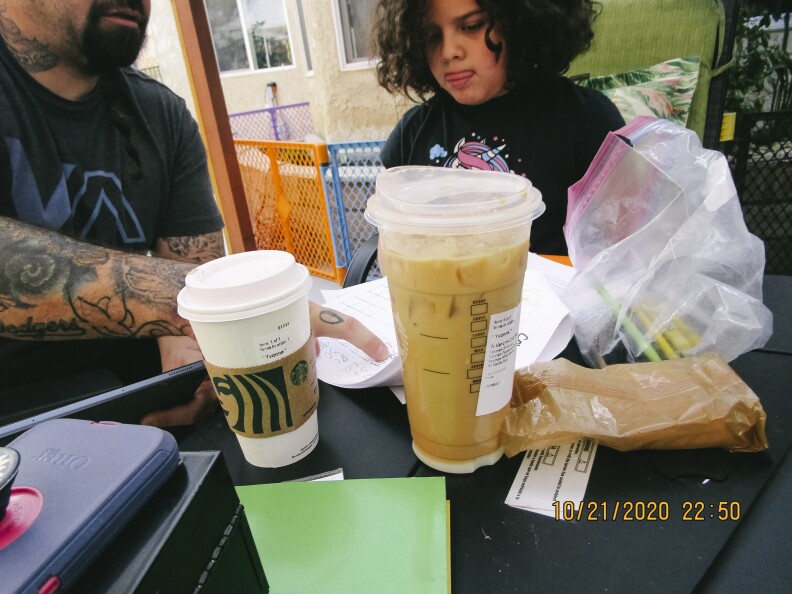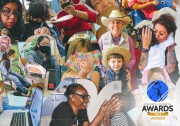-
We gave cameras to 12 Southern California child care providers, educators and caregivers and asked them to document their lives starting in the summer of 2020.
-
Join a live virtual event on June 17 and see the photos in real life at a series of photography installations throughout the region.
On the days when Jackie Jackson is short-staffed at her South Central Los Angeles home child care, going to the bathroom requires a little creativity.
She turns on music — some days it’s zydeco, on others it’s salsa — and gets the kids really grooving.
When the music stops, the kids know to freeze and Jackie dashes in the bathroom.
“I do my peepee, come back out, and everybody’s frozen, and I’m like, ‘Good job!’’’ she says.

Jackie cranks up the music again and then another “Freeze!” so she can dart into the bathroom again to wash her hands.
“You have to do what you can do, when you can do it,” Jackie says.
Caring for children requires physical, mental, emotional, and even spiritual energy, the providers told us.
In a system that’s often overburdened and underfunded, providers are rising before the sun to welcome families into their homes and tucking the kids into bed for overnight care, filling out paperwork during naptime, planning curriculum, soothing meltdowns, and coaching parents — much of it while caring for their own families.

Turnover has long been a problem in the early childhood care and education field. An estimated 30% of child care workers leave their jobs each year.
Existing studies identify factors that wear down early educators over time, like low pay, isolation and a lack of professional appreciation.
“We have a workforce of child care providers better than what we deserve,” says Yale child psychiatry and psychology professor Walter Gilliam. “I just don’t know how long we can keep that, unless we treat them better.”
And the pandemic — wait for it — might make things worse.
The Center for the Study of Child Care Employment at UC Berkeley found that as of last fall, the early care and education workforce was shrinking — as of October 2020, it was 83% as large as it was in February 2020, before the pandemic hit.
We have a workforce of childcare providers better than what we deserve.
Even if providers don’t leave the profession, research shows stress and emotional exhaustion can result in lower quality care for kids.
“It’s so important to remember the emotions and well-being of educators, nannies, parents,” says Nastassia Hajal, a child clinical psychologist and assistant clinical professor at UCLA. “They will be…the best sort of emotional regulation support partner to a young child if they are themselves feeling emotionally comfortable and confident.”
-
Share a photo and your story with the hashtag #childcareunfiltered. We may even feature some of your community stories on LAist throughout the summer.
When LAist first convened the dozen child care providers who participated in this project, we asked them to also capture their lives outside their roles as caregivers.
They showed us that caring for themselves is essential to nurturing children.
“We’re human, too,” Lancaster family child care provider Yvonne Cottage says. “We go through burnout, we go through stress, we go through all of that, right? But every morning, we still wake up, we grab our coffee, and we go in and we smile, and we’re ready for the kids.”

Yvonne has two journals, one for teaching, and another made of purple leather with gilded pages where she writes out letters to herself and God.
The most frustrating days are when every tool in her teacher toolbox isn’t helping a child or when someone rings the doorbell during naptime, despite the sign outside.
“But it’s like I tell the kids, ‘What do you do with it?’ It’s OK to get mad, but what do you do with it?” Yvonne says. “It’s OK to be disappointed. But what do you do with it? And how long do you stay there?”
Yvonne gives herself “timeouts.” She writes, reads the Bible, wakes up early to work out, and on the Saturdays she’s not working, she drives out to the beach.

The airplane oxygen mask is a metaphor that’s mentioned a lot when talking about self-care — you have to take care of your own needs before you can help others.
UCLA child psychologist Hajal says the phrase can sometimes lead to the misconception that adults can never be stressed out around kids.
“It could be a really important learning experience for a child to see their caregiver stressed and acknowledge it, and then do something to make it better. That’s part of how kids learn,” Hajal says.
Mid-City Early Head Start teacher Ruth Flores is in the car by 5:30 each morning to drive her mom to work at a Crenshaw factory. She also takes her to diabetes-related doctor appointments.
“Sometimes I feel like ‘OK, where is my time?’” Flores says. “I don’t have ‘me’ time.”
Her solution? Read passages from the Bible when she can’t sleep, or wake up at 4 a.m. to reclaim a few extra minutes before the day starts.
Ruth finds comfort in the words of Revelation 21:4, which talks about the easing of sorrow, the end of crying, pain, death and mourning after Christ’s return to earth.



Oxnard-based nanny Melissa Rivera also starts her days with a reading from the Bible.
Then by 7:30, she’s at her client family’s home, where the kids call her Mimi, and it’s “all hands on deck,” checking for brushed teeth, making breakfast, filling out chore charts and coordinating virtual learning.
Her employment with a family often lasts for years. Babies become toddlers, preschoolers become pre-teens. A father once told her the days go by slowly, but the years go by fast.
She wishes she could freeze the sweetest moments.
Like on a recent day, when the 2-year-old she works with pressed her hands to the sides of Melissa’s face and asked, “‘Mimi, will you please sit with me?’ and I just said, ‘I will sit by you for the rest of my life.’”

The impermanence of the work is also something Melissa says reassures her during the challenging days.
In the end, she gets to go home to her husband, two cats, Netflix, and her own bed.
“I don’t have the fear and the worry, and the anxiety,” Melissa says. “I’m not losing sleep.”

Last fall, West Los Angeles preschool teacher Maria Gutierrez dropped her husband off at Kaiser Permanente West Los Angeles Medical Center for gastrointestinal surgery. The coronavirus safety guidelines meant she had to wait at home for him to be discharged.

Maria makes the point that in addition to caring for other families, providers like her care for their own loved ones, too. “We have a lot of responsibility on our backs, on our shoulders,” Maria says.
A few weeks later, her husband felt well enough for sunset seaside tacos in Hermosa Beach.
“So for me, making him feel good was my priority,” Maria says

When Maria has a break in between virtual teaching and caring for her grandson, she walks into her backyard to say hello to Kiko, her pet bird of more than 10 years.
The cockatiel whistles in return.
With a little more time, she might fill up the bathtub with hot water and soak for a bit.
One stressful week, Maria noticed "My hair was already white!" But with salons closed during the pandemic, she started dyeing her own hair.
La Habra preschool director Manoja Weerakoon managed to book a salon appointment during the brief window it was open last fall.

“It’s not that I am vain or something,” Manoja says. “You have to look nice for the kids. They have to feel that they admire you.”

Gardena family child care provider Jeanne Yu finds peace in a well-organized room. There’s accomplishment in a neatly arranged bookshelf, even if her friends can’t tell the difference.
“The only downfall is that I’ll find other things to clean,” she says.
Before the pandemic, she’d work out or go to a yoga class to unwind. Now her bedroom is the “safe place,” the only space not dedicated to child care in the house. There, she’ll curl up under a thick blanket and watch TV shows.
“I’m always on the go,” Jeanne says. “So I’ve learned a lot to rest.”
Her go-to is Korean dramas, and she purchased Netflix for the first time during the pandemic.

“I’ll be doing paperwork, and then watching TV because I feel like then it’s being efficient and I’m not, quote-unquote, ‘wasting time,’” Jeanne says. “But for me to actually sit in bed with a blanket and watching means, like, I'm done for the day.”
For all the challenges inherent in the job, providers say, the reward is also built into the work.
The relationships with children, their families, and the community lift these caregivers’ spirits and refuel their motivation to work with kids for years to come.
Santa Monica preschool teacher Brenda Cruz sums it up.
“As you see children grow and learn,” she says, “You’re also learning.”

-
The hundreds of thousands of students across 23 campuses won't have classes.
-
Over 100 students from Cal Poly Pomona and Cal Poly San Luis Obispo learned life-changing lessons (and maybe even burnished their career prospects).
-
The lawsuit was announced Monday by State Attorney General Rob Bonta.
-
Say goodbye to the old FAFSA and hello to what we all hope is a simpler, friendlier version.
-
The union that represents school support staff in Los Angeles Unified School District has reached a tentative agreement with district leadership to increase wages by 30% and provide health care to more members.
-
Pressed by the state legislature, the California State University system is making it easier for students who want to transfer in from community colleges.
























